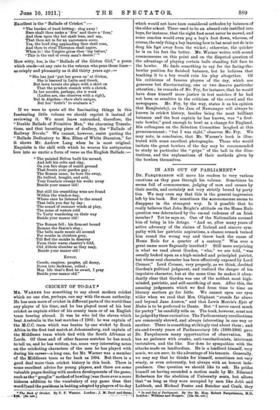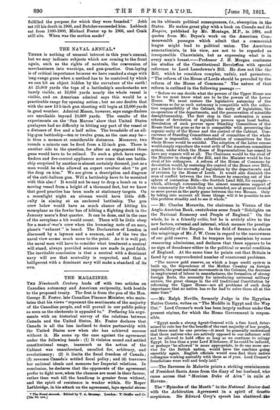IN AND OUT OF PARLIAMENT.•
DR. FARQUHARSON will move his readers to very various emotions as they pass through his volume. Sometimes he seems full of commonsense, judging of men and causes by their merits, and certainly not very strictly bound by party ties. We may even say that this is the general impression left by his book. But sometimes the commonsense seems to disappear in the strangest way. Is it possible that he really believes that John Bright's attitude on the Home Rule question was determined by the casual rudeness of an Irish member P Yet he says so. One of the Nationalists accused him of being in his dotage. "And so, after many years of active advocacy of the claims of Ireland and sincere sym- pathy with her patriotic aspirations, a chance remark turned him round the wrong way and threw back the cause of Honie Rule for a quarter of a century." Was ever a great name more flagrantly insulted ? Still more surprising is what we read about Gordon, "who," we are told, "was usually looked upon as a high-minded and principled patriot, but whose real character has been effectively exposed by Lord Cromer." Lord Cromer, very properly, as we think, doubted Gordon's political judgment, and realized the danger of his impulsive character, but at the same time he makes it abun- dantly clear that Gordon was one of the noblest, most high- minded, patriotic, and self-sacrificing of men. After this, the amazing judgments which we find from time to time on literary matters go for little. We cannot open our eyes wider when we read that Mrs. Oliphant "stands far above and beyond Jane Austen," and that Lewis Morris's Epic of Hades is to be preferred to Dante. But "I never cared much for poetry" be candidly tells us. The book, however, must not be j udged by these curiosities. The Parliamentary recollections are commonly shrewd, and always interesting in one way or another. There is something strikingly real about them ; and six-and-twenty years of Parliamentary life (1880-1906) gave Dr. Farquharson many opportunities of observation. He has no patience with cranks, anti-vaecinationists, intolerant teetotalers, and the like. Nor does he sympathize with the attacks made on landlordism. He is a landlord himself, very much, we are sure, to the advantage of his tenants. Generally, we may say that he thinks for himself, sometimes not very wisely, or even coherently, but always with an honest inde- pendence. One question we should like to ask. He prides himself on having seconded a motion made by Mr. Edmund Robertson for the abolition of University seats, but allows that "as long as they were occupied by men like Jebb and Lubbock, and Michael Foster and Butcher and Craik, they • In and Out of Parliament. By the Rt. Hon. Robert Farquharson, M.D. London Williams and Norgate. [12s. 64. net.]
fulfilled the purpose Jor which they were founded." Jebb eat till his death in 1906, and Butcher succeeded him. Lubbock eat from 1880-1900, Michael Foster up to 1906, and Craik still sits. When was the motion made?











































 Previous page
Previous page